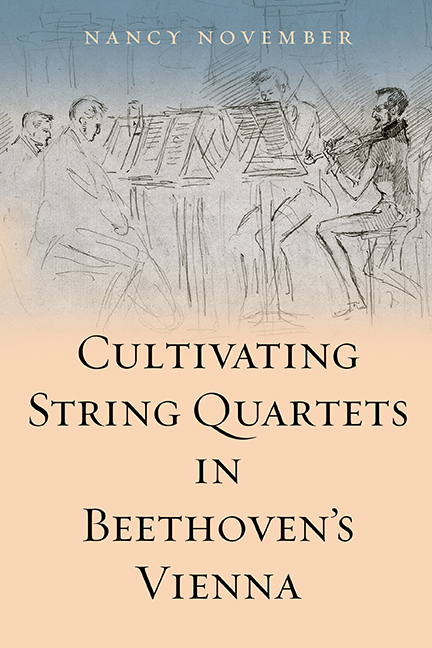Book contents
- Frontmatter
- Contents
- List of Illustrations
- List of Musical Examples
- Acknowledgements
- Introduction
- 1 Defining Chamber Music in the Early Nineteenth Century
- 2 Celebrating Haydn, Cultivating Opera
- 3 Selling String Quartets in Beethoven's Vienna
- 4 Locating String Quartets in Beethoven's Vienna
- 5 Early Nineteenth-Century Performance and Criticism
- 6 Sociability, Showmanship, and Study: ‘Quartet Friends’
- 7 The String Quartet and the Listener
- 8 Schubert's Song, Beethoven's Theatricality
- Epilogue: Constructing ‘Viennese Chamber Music’
- Bibliography
- Index
6 - Sociability, Showmanship, and Study: ‘Quartet Friends’
Published online by Cambridge University Press: 16 May 2018
- Frontmatter
- Contents
- List of Illustrations
- List of Musical Examples
- Acknowledgements
- Introduction
- 1 Defining Chamber Music in the Early Nineteenth Century
- 2 Celebrating Haydn, Cultivating Opera
- 3 Selling String Quartets in Beethoven's Vienna
- 4 Locating String Quartets in Beethoven's Vienna
- 5 Early Nineteenth-Century Performance and Criticism
- 6 Sociability, Showmanship, and Study: ‘Quartet Friends’
- 7 The String Quartet and the Listener
- 8 Schubert's Song, Beethoven's Theatricality
- Epilogue: Constructing ‘Viennese Chamber Music’
- Bibliography
- Index
Summary
Fifty years ago in Germany, there were three groups of quartet friends. The first of these played Haydn and Mozart, plus Boccherini, Pleyel, Gyrowetz, Neubauer, Kozeluch, Dittersdorf … From Krommer they took at most the early works into their programme; Beethoven lay far from them … The second group played the quartets of Beethoven next to Mozart and Haydn … but they did not usually go further than Op. 74 … To these main girders of their programme were then added: Krommer, Peter Hänsel, Fesca (etc.) … There came yet a third group of quartet friends … this third group placed and places Beethoven's quartets high above those of Haydn and Mozart …
Wilhelm Heinrich Riehl left an illuminating account of German chamber music culture around the time of Beethoven's death. He characterised three groups of ‘quartet friends’: amateur performers, who would also be the primary listeners; more advanced amateur performers, virtuosi, and their audiences; and connoisseur listeners, advanced performers, and virtuosi. This chapter investigates a period in Viennese quartet culture ten to twenty years later than that covered in Chapter 2, considering how composers addressed ‘quartet friends’ in Vienna in the 1810s and 1820s. I will discuss each of Riehl's three groups in turn, under the headings ‘sociability’, ‘showmanship’, and ‘study’, which signify their distinguishing aspects.
Riehl also observed how the culture of chamber music had changed during and after the period central to this book. He noted that as private quartet soirées gave way to semi-private house concerts, and as public concerts became established, the repertoire of string quartets performed became ever narrower. Eventually the quartets of Krommer, Hänsel, Fesca, and other once popular composers disappeared from the repertoire. The third group of connoisseur quartet friends, he observed, were at first a very small minority, but by his day they had become powerfully influential, a phenomenon explored at the end of Chapter 8.
A new generation of string quartet composers had risen to prominence by the 1810s and 1820s, not all of them Viennese. I attend particularly to the works of three of the composers Riehl considers, who are little known today – Krommer, Hänsel, and Fesca, with mention of Eybler, Onslow, and Mayseder – rather than to the usual triumvirate, Haydn, Mozart, and Beethoven.
- Type
- Chapter
- Information
- Cultivating String Quartets in Beethoven's Vienna , pp. 147 - 175Publisher: Boydell & BrewerPrint publication year: 2017



